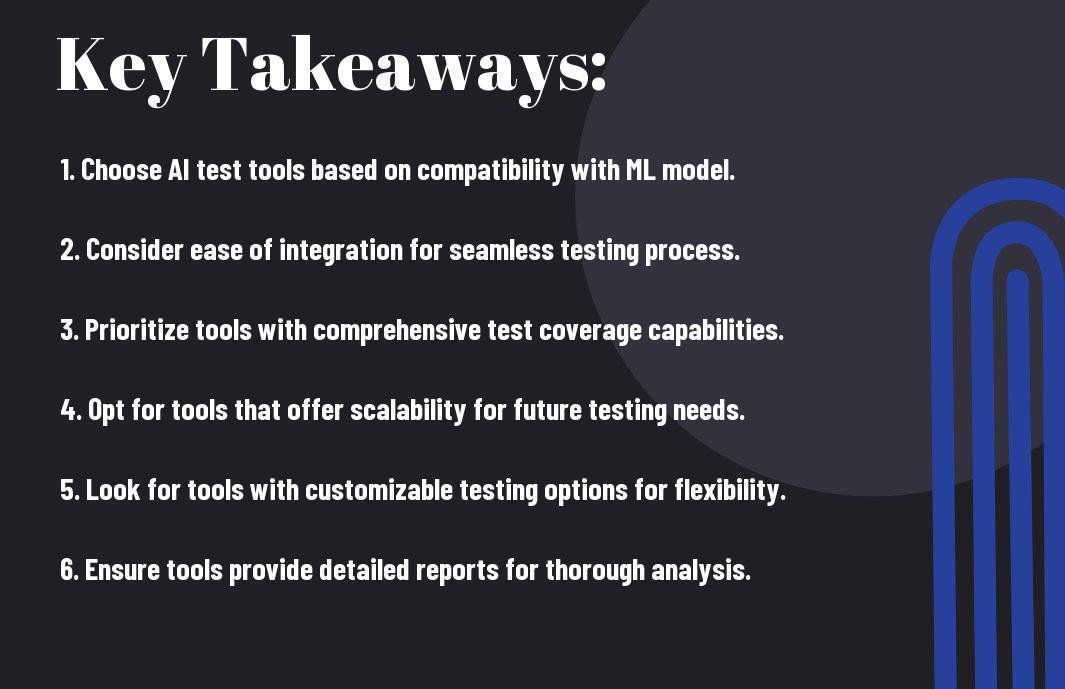There’s a multitude of AI test tools available to streamline the testing process for your machine learning models. Selecting the right one can significantly impact the efficiency and accuracy of your testing procedures. In this comprehensive guide, we will examine into the criteria for choosing the best AI test tools tailored to your specific ML model testing needs. From automated testing platforms to data monitoring tools, we will explore the important features to consider when selecting the perfect tool for your testing arsenal.
Key Takeaways:
- Understand Your Model’s Requirements: It is important to carefully assess your ML model’s specific needs and challenges to determine the most appropriate AI test tools.
- Consider Tool Compatibility: Ensure that the AI test tools you choose are compatible with your ML framework, programming language, and overall testing strategy to optimize efficiency.
- Focus on Robustness and Scalability: Prioritize AI test tools that offer robust testing capabilities and scalability to meet the evolving demands of your ML projects.

Key Considerations for Selecting AI Test Tools
Evaluating Model Complexity
For evaluating model complexity, consider the depth and intricacy of your machine learning model. Some AI test tools may be better suited for simple models, while others excel in handling complex neural networks or deep learning algorithms.
Assessing Data Quality and Quantity
Quality and quantity of data play a crucial role in ML model testing. Ensure that the AI test tools can handle varying data volumes and types, including structured, unstructured, and labeled datasets.
Considerations: When assessing data quality, look for tools that offer data validation features to check for inconsistencies, anomalies, and missing values. Additionally, consider the scalability of the tool to accommodate large datasets and how it handles data preprocessing tasks.

Types of AI Test Tools
It is crucial to select the right AI test tools to ensure the efficient testing of ML models. Understanding the different types of AI test tools can aid in making an informed choice. Below is a breakdown of various types of AI test tools:
| Black Box Testing Tools | White Box Testing Tools |
|---|---|
| … | … |
| … | … |
| … | … |
| … | … |
### Black Box Testing Tools
Black box testing tools are ideal for assessing the functionality of ML models without requiring knowledge of the internal workings. They focus on inputs and outputs, making them suitable for detecting discrepancies in expected outcomes.
### White Box Testing Tools
White box testing tools investigate into the internal structure and logic of ML models. They provide insights into the algorithms, making them valuable for pinpointing issues related to code implementation and data processing.
This Top 7 Best AI Testing Tools for Test Automation guide reviews various AI test tools tailored for ML model testing.
Essential Features of AI Test Tools
Many AI testing tools on the market offer a plethora of features catered to different needs. For a comprehensive overview of the imperative features to consider in AI test tools, check out The Ultimate Guide To AI Testing Tools.
Automation Capabilities
Any effective AI test tool should possess robust automation capabilities. This feature enables the efficient execution of various tests, saving time and effort in the testing process.
Integration with ML Frameworks
The integration with popular ML frameworks is crucial for seamless testing of machine learning models. AI test tools that can easily integrate with frameworks like TensorFlow, PyTorch, or scikit-learn offer flexibility and convenience in testing ML models.
Reporting and Analytics
To ensure comprehensive testing and analysis of ML models, AI test tools should provide advanced reporting and analytics features. These capabilities offer insights into the performance of the models, helping users make informed decisions and improvements.
Analytics such as visualization of metrics, comparison of model versions, and trend analysis are imperative for thorough evaluation and enhancement of ML models.
Best Practices for Implementing AI Test Tools
For a comprehensive guide on implementing AI test tools, refer to The Ultimate Guide to AI/ML Software Testing.
Defining Testing Objectives
The first step in implementing AI test tools is defining clear testing objectives. It is important to establish what aspects of the ML model you want to test and what specific metrics you aim to improve.
Creating a Testing Framework
Defining a testing framework involves outlining the processes, tools, and resources that will be used to conduct the tests. This framework should include test environments, data sets, testing methodologies, and criteria for evaluating the results.
Objectives should be aligned with the overall goals of the ML model and should focus on areas such as accuracy, reliability, performance, and scalability. By establishing clear objectives, you can ensure that the testing process is targeted and effective in improving the model’s performance.
To wrap up
With this in mind, choosing the best AI test tools for your ML model testing is a crucial step in ensuring the accuracy and reliability of your machine learning projects. By considering factors such as the types of tests needed, scalability, ease of integration, and budget, you can select the right tools that will help you identify and resolve any issues in your ML models efficiently. Keep in mind that continual testing and monitoring are imperative for maintaining the performance of your AI applications.
FAQ
Q: Why is choosing the right AI test tools important for ML model testing?
A: Choosing the right AI test tools is crucial for ML model testing as it ensures the accuracy, reliability, and efficiency of your model evaluation process. Proper tools help in identifying bugs, vulnerabilities, and performance issues in the AI model, leading to improved decision-making and overall model performance.
Q: What are some key factors to consider when selecting AI test tools for ML model testing?
A: When choosing AI test tools for ML model testing, important factors to consider include compatibility with your ML framework, ease of integration, scalability, support for various data types, interpretability of results, and the presence of advanced features like automated testing, model monitoring, and debugging capabilities.
How can one ensure the effectiveness of AI test tools for ML model testing?
To ensure the effectiveness of AI test tools for ML model testing, it is important to evaluate the tools based on your specific testing needs, conduct thorough research on the tools available in the market, seek recommendations from experts, and perform pilot testing before full-scale deployment. Additionally, continuous monitoring, feedback collection, and updating of tools are important for optimizing their performance and relevance to your ML model testing requirements.











